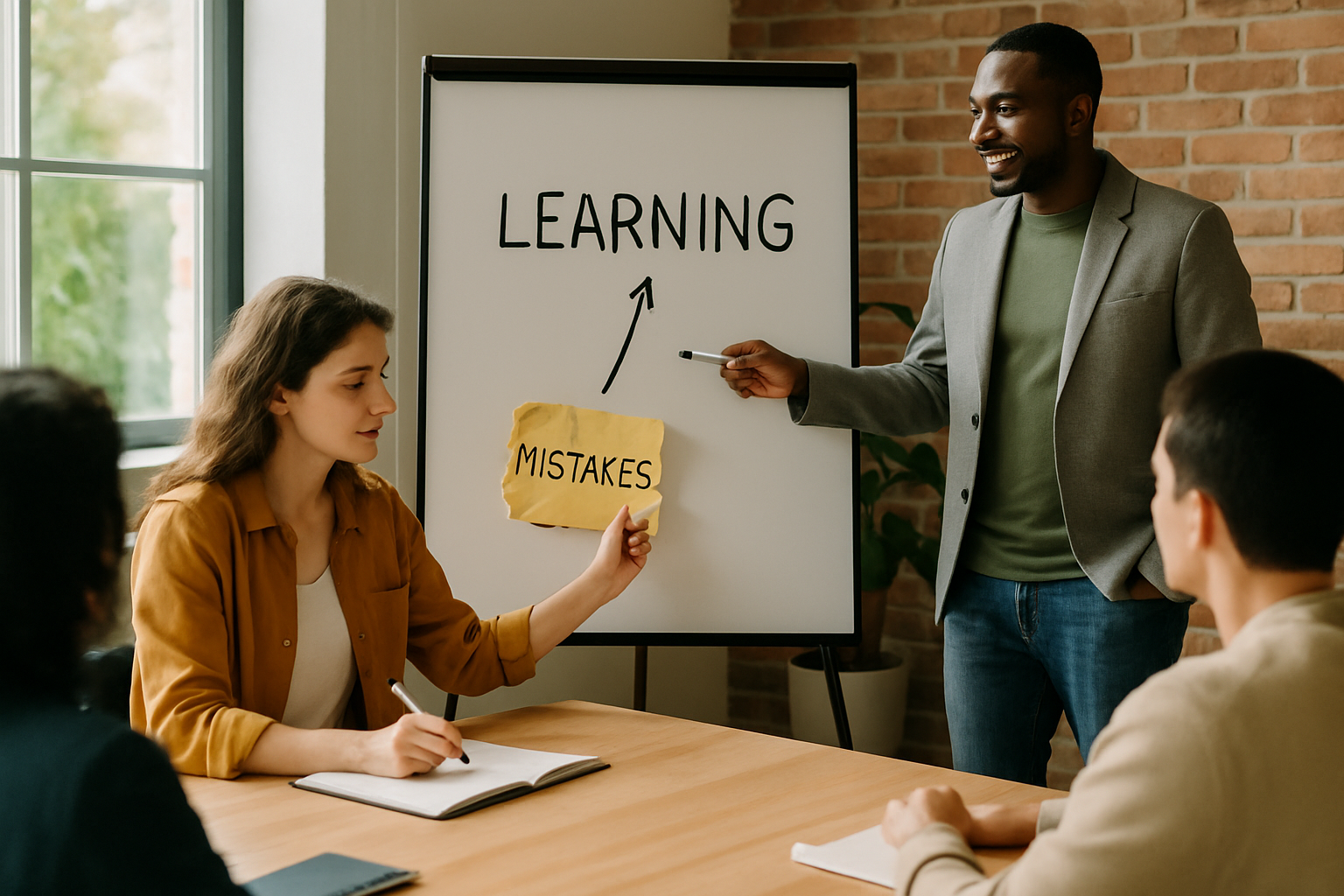
Turning mistakes into learning assets
Mistakes are often seen as setbacks, especially in the fast-paced world of technology. Yet, for those who seek to thrive in this field—be they software engineers, data analysts, or aspiring technologists—mistakes are not just inevitable; they are invaluable. Turning mistakes into learning assets is a skill, one that can be honed through intentional documentation and reflective practice. For women in technology, neurodivergent learners, and anyone embarking on a technical career, this transformation is not only empowering but essential.
Why Mistakes Matter in Tech
In the realm of software development and IT, errors are a daily occurrence. Code rarely works perfectly the first time; systems fail, bugs elude detection, and unexpected edge cases emerge. It’s tempting to fix the problem and move on, but doing so misses a crucial opportunity for growth.
Every error carries a lesson. When we encounter a bug, we are confronting the limits of our understanding. The process of diagnosing and resolving mistakes forces us to rethink our assumptions, deepen our technical knowledge, and build resilience. For neurodivergent learners, who may approach problem-solving in unique ways, the act of wrestling with bugs can reveal strengths in pattern recognition, lateral thinking, or persistence.
“Success is not built on success. It’s built on failure, frustration, and sometimes even catastrophe.”
– Sumner Redstone
Overcoming the Fear of Failure
The stigma around making mistakes is particularly acute for underrepresented groups in technology. Women and neurodivergent professionals often feel extra pressure not to fail, fearing their mistakes will be seen as proof of inadequacy. This fear can stifle experimentation and innovation.
Instead, organizations and individuals must normalize error-making as an integral part of growth. When teams openly share their bugs and failures, they foster psychological safety and collective learning. For individuals, the ability to document and reflect on errors provides a sense of control and turns anxiety into curiosity.
Documenting Bugs: Building Your Personal Knowledge Base
Documenting mistakes isn’t just for large teams or open-source projects. Every technologist benefits from maintaining a personal bug log. This living document becomes a treasure trove of insights and a map of your evolving expertise.
How to Keep an Effective Bug Log
- Be Specific: Record the exact error messages, the context in which the bug appeared, and the steps that led up to it.
- Describe Your Thought Process: Capture your initial hypotheses about the cause, the debugging steps you tried, and what eventually worked.
- Reflect on the Root Cause: Was the bug due to a misunderstanding of the technology, a copy-paste error, or a gap in documentation?
- Record Resources: Link to helpful articles, Stack Overflow threads, or documentation that aided your troubleshooting.
This process is particularly helpful for neurodivergent learners, who may benefit from visualizing patterns or seeing concrete step-by-step records. Over time, these notes become an external memory, reducing cognitive overload and making it easier to spot recurring issues.
Tooling and Templates
There’s no one-size-fits-all approach. Some prefer pen-and-paper journals, others use markdown notes in tools like Notion or Obsidian, while teams may employ issue trackers like Jira or GitHub Issues. What matters is consistency and accessibility.
Consider using a template for each entry:
Bug/Issue:
Context:
Error Message:
Hypotheses:
Debugging Steps:
Solution:
References:
Such templates not only structure your thinking but also make it easier to share knowledge with peers or future collaborators.
Reflecting on Errors: Turning Hindsight into Foresight
Documenting mistakes is only the first step. Reflection turns raw data into wisdom. After encountering and resolving an error, take time to revisit the experience. This practice accelerates learning and helps internalize new patterns.
Questions for Productive Reflection
- What assumptions did I make that turned out to be incorrect?
- How could I have detected this bug earlier?
- What did I learn about the underlying technology or workflow?
- How can I adjust my habits or processes to avoid similar mistakes in the future?
For educators and mentors, encouraging students to reflect on their errors fosters a growth-oriented mindset. In classrooms or bootcamps, group retrospectives on bugs can demystify the error-making process and build camaraderie.
“It’s not that I’m so smart, it’s just that I stay with problems longer.”
– Albert Einstein
From Individual to Collective Learning
While personal reflection is powerful, collective learning transforms teams and organizations. When teams embrace a culture of sharing bugs and lessons learned, the pace of improvement accelerates. This is especially important in fast-evolving fields like machine learning, cybersecurity, or DevOps, where yesterday’s best practices can quickly become obsolete.
Effective Practices for Team Learning
- Blameless Postmortems: After major outages or failures, conduct reviews that focus on systems and processes, not individuals.
- Knowledge Base and Wikis: Encourage contributors to log bugs, solutions, and workarounds in a searchable repository.
- Regular Sharing Sessions: Host “bug of the week” discussions where team members present interesting errors and how they resolved them.
- Mentorship and Pair Debugging: Pairing juniors with seniors during debugging sessions not only solves problems faster but also transfers tacit knowledge.
For women and neurodivergent professionals, these practices create an environment where diverse perspectives are celebrated, and learning is democratized. No one should feel alone in their struggles; sharing errors is a powerful way to foster inclusion.
Leveraging Technology for Smarter Learning
Today’s technologists have an unprecedented array of tools to document, analyze, and share their learning from mistakes. From AI-powered code assistants to collaborative documentation platforms, technology itself can amplify the benefits of reflective practice.
AI and Debugging
Modern integrated development environments (IDEs) now incorporate AI-driven suggestions that analyze code, predict errors, and even propose fixes. When combined with personal documentation, these tools offer a feedback loop that rapidly accelerates skill acquisition.
For neurodivergent learners, AI can level the playing field by offering tailored hints, alternative explanations, or visualizations. For women in tech, who may face barriers to mentorship or community, digital platforms provide new ways to connect and share experiences.
Open Source and Community Learning
Contributing to open-source projects exposes individuals to a wide spectrum of bugs and solutions. Public issue trackers, pull request reviews, and community forums are goldmines for learning—every error documented becomes part of a shared educational resource.
Engaging with these communities builds confidence and provides access to a global network of mentors and collaborators.
Teaching Error Reflection: Practical Strategies for Educators
For educators, career coaches, and mentors, teaching learners how to document and reflect on mistakes can be transformative. Here are some actionable strategies:
- Normalize error logs as part of assignments: Require students to submit brief bug logs with projects, focusing on their learning journey, not just the final outcome.
- Model vulnerability: Share your own mistakes and what you learned from them. This models resilience and reduces stigma.
- Facilitate group retrospectives: Regularly review common bugs as a class or team, discussing patterns and prevention strategies.
- Provide templates and scaffolding: Offer structured formats for error documentation and reflection, especially helpful for neurodivergent learners.
- Encourage peer feedback: Foster an environment where students review each other’s bug logs, offering empathy and alternative perspectives.
These practices not only accelerate technical mastery but also foster confidence, empathy, and a sense of belonging—critical ingredients for sustaining a diverse and innovative tech ecosystem.
From Blame to Brilliance: Rewriting the Narrative
The journey from novice to expert in technology is paved with mistakes. Reframing errors as learning assets is an act of courage and creativity, one that challenges conventional narratives about competence and success. For women and neurodivergent technologists, this approach is both a shield against bias and a source of empowerment.
When we document and reflect on our mistakes, we build more than technical expertise—we cultivate humility, curiosity, and a deep sense of agency. We learn that progress is measured not by the absence of errors, but by our capacity to grow from them.
“There are no failures, only feedback.”
– Robert Allen
Let every bug, error, and misstep become a stepping stone. In the process, we not only accelerate our own learning but also light the path for others who follow.


